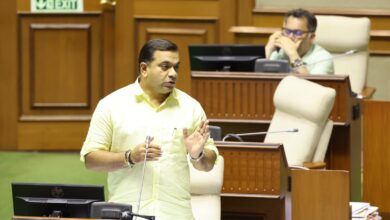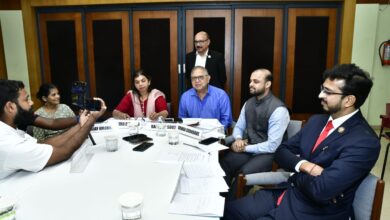
National Education Policy Implementation for 9th standard
Mr. Prasad Lolyekar, the Secretary of Education, provided information regarding the implementation of National Education Policy 2020 at the Secondary Stage (Class IX) for the Academic Year 2024-2025.
In addition to Mr. Lolyekar, other attendees at the press briefing included Mr. Shailesh Zingde, Director of Education, Mr. Bhagirath Shetye, Chairman of GBSHSE, Dr. Shambhu Ghadi, State Project Director of GSS, Mrs. Meghana Shetgaonkar, Director of SCERT, Mr. Kanta Patnekar, Chairman of the Steering Committee for National Education Policy Implementation at School Education, and Mr. Jose Rebello, Chairman of the State Curriculum Framework Committee for the Secondary Stage.
According to National Education Policy-2020, School Education is divided into four stages:
- Foundational Stage (Nursery to II),
- Preparatory Stage (III to V),
- Middle Stage (VI to VIII), and
- Secondary Stage (IX to XII).
National Education Policy-2020 was first implemented at the Foundational Stage – I in the academic year 2023-2024. This year, it has also been implemented at the Foundational Stage – II and the Secondary Stage (Class-IX).
In the educational framework, we acknowledge 10 vital Curricular Areas, including three languages (R1, R2, & R3), Science, Mathematics, and Computational Thinking, Social-Science and Humanities, Inter-Disciplinary Areas, Art Education, Physical Education, and Vocational Education.
Click Here! Watch the press conference on National Education Policy Implementation for 9th standard
Language Options:
- R1: English
- R2: Konkani, Marathi, Hindi
- R3: Any language native to India currently offered by Goa Board, including options not chosen at R2 (such as Konkani, Marathi, or Hindi)
Eligibility Criteria:
- Students may choose a language offered by the Goa Board for R3
- Students who chose a foreign language (such as French, Portuguese, German, or Arabic) at Class VIII will be granted relaxation in R3
- This relaxation applies only to students who have opted for a foreign language at the Class VIII level.
The primary focus is on aligning the current syllabus with the Curricular Goals, Competencies, and Learning Outcomes outlined in the National Curriculum Framework 2023 for subjects such as Language, Mathematics, Science, and Social Science. The Inter-Disciplinary Area will encompass topics such as Environmental Education, Road Safety and Awareness, Financial Literacy, Electoral Literacy and General Laws, as well as participation in organizations like Scouts & Guides, JRC, NCC, and Social Service.
In the first semester, the emphasis will be on Environment Education, which will carry 2 credits. In the second semester, topics such as Financial Literacy, Road Safety, Electoral Literacy, General Laws, and participation in Scouts & Guides, JRC, NCC, or Social Service will be covered, each carrying 1 credit.
The Vocational Education program will encompass 15 NSQF Sectors. The current Computer Subject will be transitioned into NSQF. Additionally, Physical Education will cover Physical Education & Well-being, as well as Yoga. Art Education will incorporate Fine Art, Theatre Art, Music, and Performing Art.
Examinations will follow a Semester Pattern in all Curricular Areas, with two Semesters in a year. For External Assessment, question papers will be provided by the Goa Board. However, teachers at schools are responsible for conducting assessments and uploading the marks on the Goa Board Portal.
- The total instructional hours across all curricular areas will be 600 hours per semester or 1200 hours per year, equating to 39 hours per week.
- Internal assessment will be conducted at the school by teachers using the Holistic Progress Card (HPC).
- Training will be provided to all teachers on how to effectively use the Holistic Progress Card for internal assessment purposes.
- Additional teachers will be provided to schools on a lecture basis as needed.
- Extended instructional hours will be available, with schools being given three model timetables to choose from while maintaining the same total instructional hours.
- The Scheme of subjects for CWSN (Children with Special Needs) students will be modified as per instructions from the Goa Board of Secondary & Higher Secondary Education.
- Heads of institutions have been informed about the implementation of the National Education Policy 2020 (NEP-2020).
- To ensure effective implementation of National Education Policy-2020 and to address school-specific issues, the Secretary of Education has scheduled taluka level visits and interactions with school management and the PTA.
- Additionally, periodic follow-up meetings will be scheduled with all stakeholders










Very interesting info!Perfect just what I was looking for!Money from blog